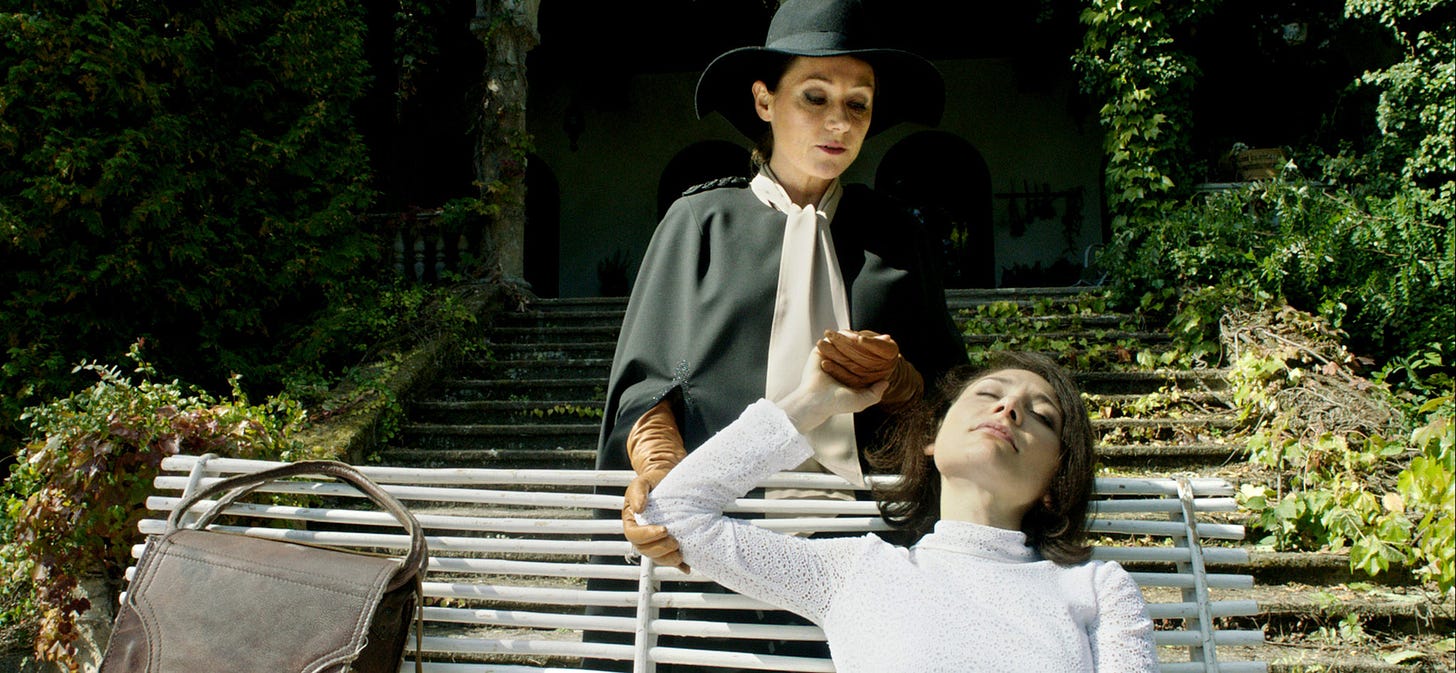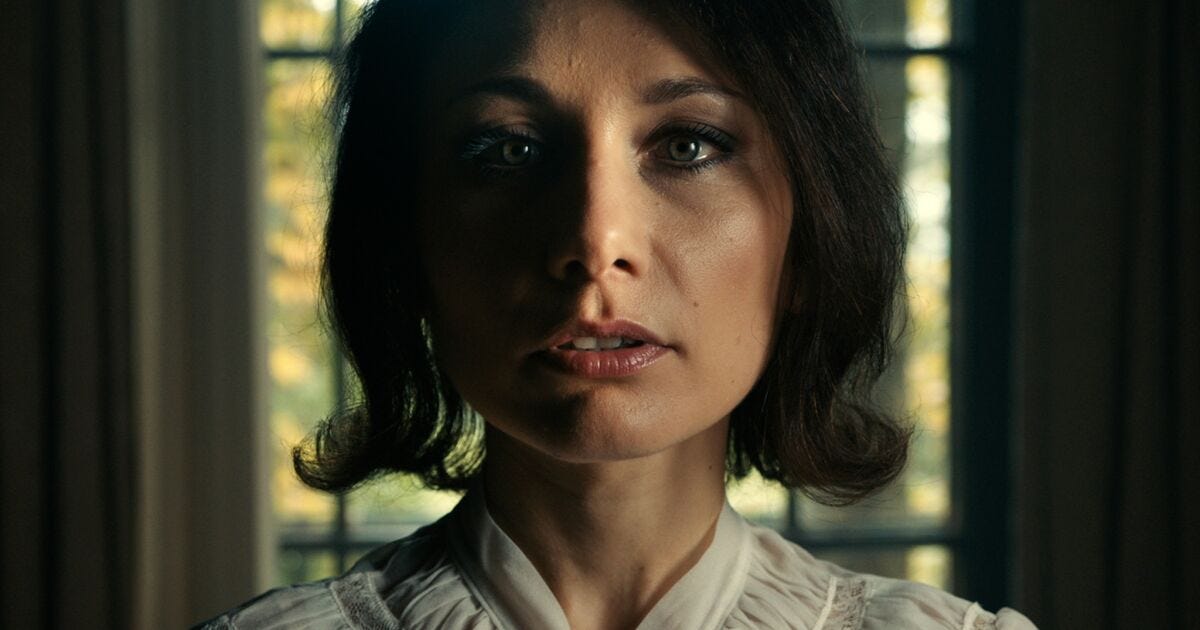The New Cult Canon: 'The Duke of Burgundy'
Peter Strickland's meticulously stylized kink connects erotic role-play to the negotiation of long-term relationships.
“As long as I’m yours, I remain alive.” — Evelyn, The Duke of Burgundy
Long-term romantic relationships rely on a kind of ongoing negotiation between two parties, a divvying of responsibilities and expectations that holds the union in balance. That’s what it means to share a life together, like a three-legged sack race where the finish line is “’til death do you part.’” It can be as simple as a division of labor: Who does the cooking? Who pays the bills? Who’s taking care of pick-ups and drop-offs at school? Or long-term scheduling or vacation-planning? And beneath the routine logistics of everyday life, there are subtler negotiations taking place, too, over what each partner needs emotionally and physically, and whether the needs of one are out of step with the other. You don’t want to be either selfish or withholding, and sometimes you have to sacrifice to the grinding labor of making a person happy.
In other words, love is about role-playing, which makes Peter Strickland’s The Duke of Burgundy, an eccentric and meticulously stylized BDSM odyssey, one of the most improbably romantic films in recent memory. It is a film about a lesbian couple that practices bondage and fussily orchestrated routines of domination and submission. There are moments when they discreetly engage in water play, and engage with a carpenter over a special spring-loaded bed with a large secret compartment underneath—or, barring that, something called a “human toilet.” Yet Strickland isn’t interested in approaching BDSM as a behavioral aberration, to be explained away by some psychological revelation that will make such desires understood. His purpose is simpler: to use BDSM as a stand-in for the role-play that goes into every relationship, even if those roles are significantly more mundane than locking your wrist-bound partner into a trunk for the night.
The credits wink cheekily at the European soft-core of the 1970s, with a series of shots following Evelyn (Chiara D’Anna), a black-cloaked beauty, riding her bicycle through the countryside. Each credit is preceded by a freeze-frame and a painted splash of color, and some of those credits catch the eye, like one for “Dress and Lingerie” and another for “Perfume,” which makes The Duke of Burgundy the rare film apart from the “Odorama” of John Waters’ Polyester to note its aromatic contributions. The date and location are not specified, but it’s far enough in the past for manual typewriters and old-fashioned slide projectors, and while it was filmed in Hungary, there’s no real-world cues that it's a real, recognizable place. From what we can tell, it’s a landscape entirely populated by women.
The opening sequence is best experienced cold, so consider this sentence both a warning and a recommendation to see this outstanding film and come back later. After parking her bike, Evelyn strolls up to the door of a country estate and knocks on the door, which finally cracks open after a deliberated protracted wait. We will learn later that the stern woman who answers is Cynthia (Sidse Babett Knudsen), but for now she’s the schoolmarm who’s annoyed at her housekeeper for being late again. Evelyn is told to clean the study. (“And don’t take all day this time.”) She scrubs the carpet on her knees while Cynthia tosses a small piece of trash to the ground. She’s told to hand-wash a pile of undergarments in soapy water and chided sharply when she doesn’t do well. Finally, behind the bathroom door, Cynthia orders Evelyn to lie down and open her mouth. Thus begins the erotic payoff.
Strickland’s decision to open The Duke of Burgundy without first clarifying Evelyn and Cynthia’s relationship is both a clever tease and an indicator of how thoroughly the two have worked out the staging of their encounter, like a theatrical production several weeks into its run. They have done this same routine before and they will do it again, augmented by notes that Evelyn leaves Cynthia to make sure she hits her marks. And yet the impossible paradox for Cynthia is that she has to follow these instructions carefully while still leaving room for surprise and carrying herself with conviction. When the two run through the same scenario again, Cynthia is given a note card that reads: “My dearest, when I ring the doorbell, please leave me waiting. A minimum of thirty seconds and a maximum of five minutes. Somewhere in the middle would be perfect. Perhaps around two minutes, thirty. But don’t do that every time, otherwise it becomes predictable.” In another scene, Evelyn gives Cynthia a 24-hour window to act, but doesn’t want her to rush to the first hour or wait for the last hour. (“So 22 hours then?” Cynthia quips.)
On the other side of things, Cynthia’s needs are much more basic. She’s happy to have Evelyn go down on her. She’d like her warm body next to her at night. And for the love of God, she would like to wear comfortable pajamas at night, rather than the complicated lingerie Evelyn orders for her. Most of the tension that arises between Cynthia and Evelyn comes from Evelyn’s selfish refusal to attend to her partner’s desires, despite their relative simplicity. When Cynthia throws out her back hauling a heavy trunk into their bedroom, she can’t get Evelyn to commit to rubbing her back, even though her agony is directly related to tending to Evelyn’s expansive fetishism. When Evelyn confesses to having a flirtation of sorts with a neighbor (“She told me off a bit”), the strain on their relationship gets worse.
Strickland arrived at The Duke of Burgundy after having made two previous films, the little-seen but promising drama Katalin Varga in 2009 and the 2012 giallo homage Berberian Sound Studio, which is more indicative of his own cinematic fetishization. He’s a British filmmaker whose tastes run more broadly European, and his heightened attention to sound and image has brought more recent works like 2018’s In Fabric and 2022’s Flux Gourmet into the realm of pure abstraction, along the lines of fellow genre experimentalists Hélène Cattet and Bruno Forzani, the Belgians known for giallo-affected oddities like Amer and The Strange Colour of Your Body’s Tears. Strickland’s sympathies may align with Cynthia here, but his sensibility makes him an unmistakable Evelyn.
Now that Strickland has five features under his belt, The Duke of Burgundy seems like a sweet spot in his career, before his style turned almost entirely into the subject. Starting with those opening credits, there are some beautiful touches throughout the film: a sensual, evocative, unconventionally choral score by Cat’s Eyes, a pop duo that consists of British vocalist Faris Badwan and Italian-Canadian soprano and multi-instrumentalist Rachel Zeffira; a love scene that unfolds in a series of superimposed images; and the integration of Cynthia and Evelyn’s shared passion for lepidopterology, the study of moths and butterfly superfamilies. At various points, the moths and butterflies underscore the evolving state of their relationship and the worry that it will eventually keep them pinned in place.
Despite the formalized kinkiness between Cynthia and Evelyn and the stresses that threaten to undo their partnership, Strickland has a wickedly dry sense of humor that gives the film a welcome playfulness. We can laugh, for example, at Cynthia constantly pouring large glasses of water for herself so she can perform for Evelyn later, and she has the sarcastic wit of a natural dominatrix. The value of The Duke of Burgundy comes from the realization that all of these discussions over hidden bed compartments and human toilets lead to a thoroughly relatable and finally touching story of true intimacy. Cynthia is willing to go through the hassles and grinding routines of pleasing Evelyn because she cares about her, and hopes she will reciprocate. Evelyn’s desires may seem greedy at times, but being “submissive” is also about giving yourself over to another person completely and trusting them to take care of you.
“I can change,” Evelyn pleads to an exhausted Cynthia near the end. “This is just a luxury. All I want is you.”
Next: The Killing of a Sacred Deer






One of my favorite moviegoing experiences. I saw it in its original run at a weekday matinee at the Plaza Theater in Atlanta. I loved the movie for itself, but there was a meta quality to my enjoyment as well -- as it unfolded in all its '70s softcore-tinged outre glory, I sat in wonderment and appreciation that, in our brutally efficient capitalistic environment, there was still someone willing to devote the space and time to showing me THIS movie. Nobody got their commercial rent paid via their Duke of Burgundy receipts -- to screen it was an act of movie love, pure and simple.
Film aside (which I haven’t seen but absolutely must now), that’s a gorgeous, well written review. The three legged sack race metaphor is so perfect, so immediately obvious, that it feels like you must have encountered it before. Great stuff.